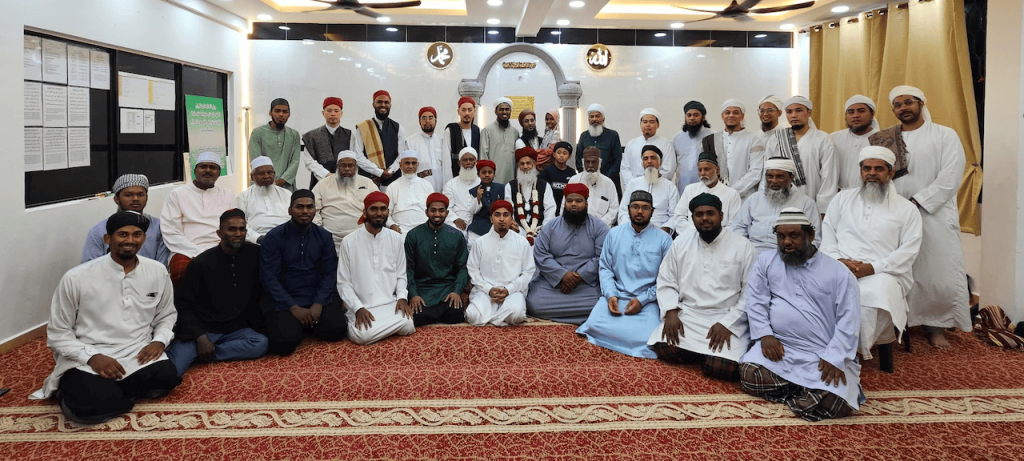In the Name of Allah, the Most Gracious, the Most Merciful
Awwaluddin Ma’rifatullah
The beginning of faith is knowing Allah
- Purpose of Life: Why Do I Exist?: Preface
- How to Worship & Know Allah: The Journey of Experiential Knowledge
- The Beginning of Deen is Knowing Allah
- Part 1/8: Acquired & Bestowed Knowledge
- Part 2/8: Sharia, Tariqa, Haqiqa, Marifa
- Part 3/8: Integration of Heart & Mind
C. Heart vs. Mind in Ma’rifatullah (Experiential Knowledge)
The journey toward Ma’rifatullah calls upon both the intellectual and spiritual dimensions of a believer.
Role of Intellectual Understanding
On one hand, the mind plays a crucial role by processing religious knowledge, analysing the signs of Allah in the universe, and comprehending the nuances of sacred texts.
This intellectual engagement provides a necessary structure, offering clarity and understanding about divine commandments, historical context, and theological principles.
However, intellectual understanding alone is insufficient; it serves as the starting point rather than the destination. It has inherent limitations—it remains confined to conceptual knowledge and cannot fully capture the deeper, ineffable experiences of Allah.
This is where the heart assumes a central role.
The heart, the seat of spiritual insight, allows for an experiential recognition of Allah that transcends mere logical analysis. It is through sincere reflection, deep devotion, and the nurturing of a personal connection with the Creator that the heart opens to receive transformative truths.
In essence, the mind provides the map, while the heart lights the way along the journey of faith.
Together, they offer a balanced pathway toward comprehensive spiritual enlightenment, ensuring that the quest for Ma’rifatullah is both intellectually informed and experientially complete.

Importance of Spiritual Insight
Spiritual insight occupies a place of central importance in the journey of Ma’rifatullah, and it is the heart that serves as its true vessel.
Unlike the mind, which can only process and analyse, the heart is the center of experiential knowledge and the primary receptor of spiritual knowledge.
It is within the heart that genuine understanding of Allah takes root and flourishes—a knowledge that is both intimate and deeply transformative.
This insight goes far beyond rational thought or theoretical comprehension.
While the intellect can point toward spiritual realities, only the heart can taste and internalise them, enabling the believer to experience Allah’s presence in a manner that words cannot express.
Through the heart, knowledge of Allah becomes living and dynamic, manifesting as an experiential awareness that permeates every aspect of one’s being.
This capacity of the heart to facilitate true divine connection is what turns faith from an intellectual exercise into a reality that shapes character, inspires worship, and colours every moment with the light of certainty and presence.




Integration of Both Faculties: Mind + Heart
In Islam, true personality development requires an integration between the heart, mind, and inner drives – these work together holistically rather than in isolation.
Mind (Intellectual Understanding): The human understanding functions through impressions received from the sensory world. For the mind to grasp something, it needs to relate it to things in the physical realm that create mental impressions.
Heart (Spiritual Perception): The heart has a unique capacity to store the deepest intelligence and wisdom, becoming the vessel for ma’rifat or spiritual knowledge.
Working Together: Those who achieve depth in knowledge by adhering to Allah commands transcend mere conceptual understanding – with spiritual authority (murshid), they begin to read the wisdom and mysteries.
Signs of Integration: When mind and heart are properly integrated, one realises that spiritual practices like prayer have very deep meaning beyond the surface level; engaging the body, heart soul, essence. This creates a deeper sense of optimism and hope in the heart.
According to Imam Al-Ghazali, while both faculties matter, the heart should receive special emphasis since it is the element within oneself that can achieve ma’rifatullah (Knowledge of Allah).
WHEN MIND AND HEART ARE PROPERLY INTEGRATED, ONE REALISES THAT SPIRITUAL PRACTICES LIKE PRAYER HAVE VERY DEEP MEANING BEYOND THE SURFACE LEVEL; ENGAGING THE BODY, HEART SOUL, ESSENCE. THIS CREATES A DEEPER SENSE OF OPTIMISM AND HOPE IN THE HEART.
The Ultimate Goal: The result of this integration is a unique form of knowledge that is deeper and divinely inspired (Ilmu Ladunni) rather than merely acquired (Ilmu Kasbi).
Such individuals become true ‘inheritors of the prophets. Those who witness their behaviour and hear their words find their hearts overwhelmed with spiritual inspiration.
This integration of mind and heart creates a comprehensive spiritual understanding that transcends either pure intellectualism or pure emotionalism. It represents the highest form of human development in pursuing Knowledge of Allah.

Key Takeaways
The journey of Ma’rifatullah engages both intellectual and spiritual faculties:
Role of Intellectual Understanding
- Functions:
- Processes religious knowledge
- Analyses divine signs
- Comprehends religious texts
- Limitations:
- Cannot alone achieve complete understanding
- Must be complemented by spiritual insight
Importance of Spiritual Insight
- Heart’s Role:
- Center of divine recognition
- Receptor of spiritual knowledge
- Seat of genuine understanding
- Characteristics:
- Goes beyond rational thought
- Enables experiential knowledge
- Facilitates divine connection
Integration of Both Faculties
- Synergy:
- Mind provides structure
- Heart provides depth
- Together enable complete understanding
- Balance:
- Neither faculty alone is sufficient
- Both must work in harmony
- Each supports the other’s development










[…] Part 3/8: Integration of Heart & Mind […]